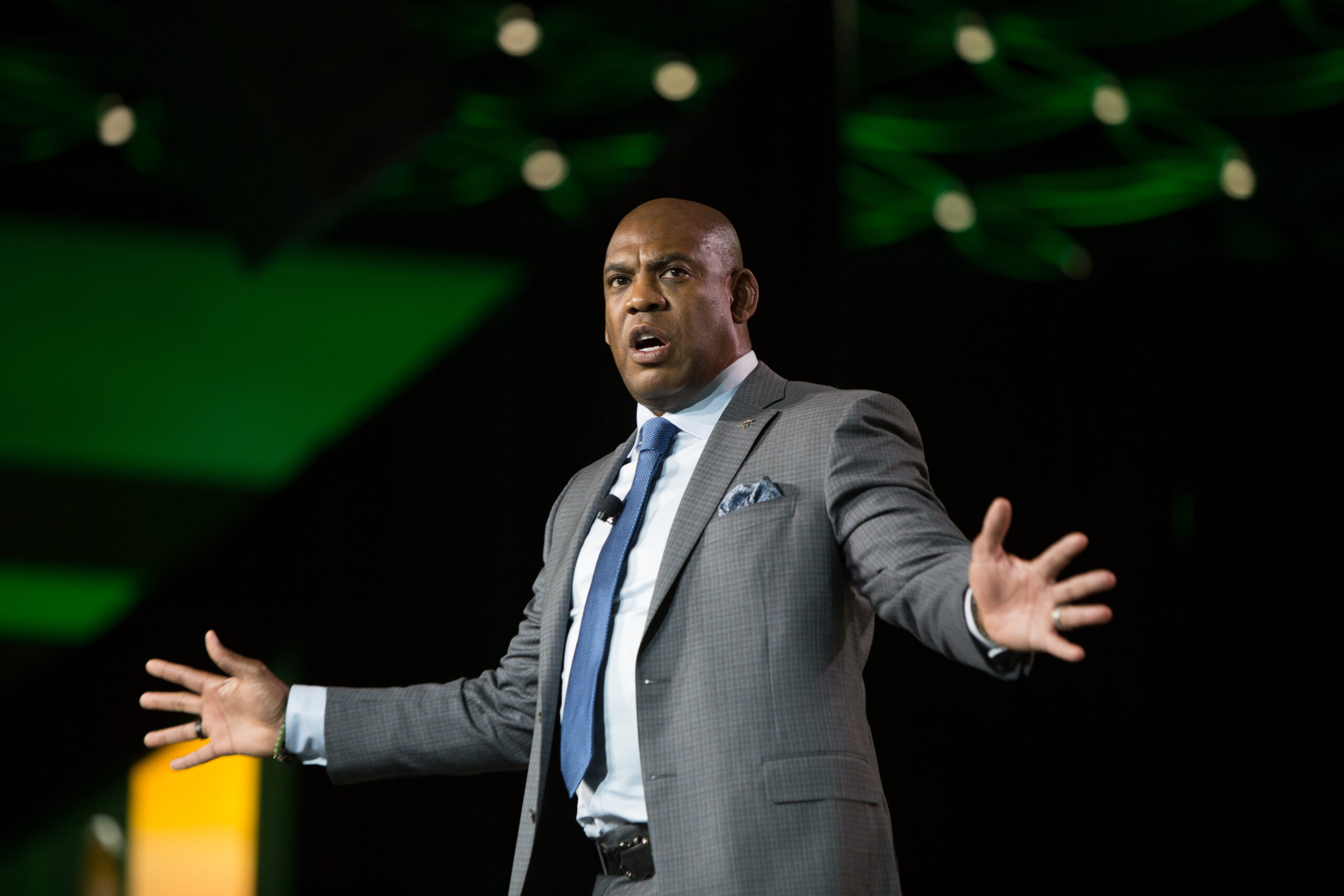
Developing Players: Both On & Off the Field with Michigan State Head Coach Mel Tucker
July 25, 2022
By Mary Watson Vergnolle, AFCA Staff Writer
With over 25 years of coaching experience, head football coach Mel Tucker led the Michigan State Spartans to an 11-2 record in his second season, creating a culture of accountability and connection among players and coaches. MSU saw a huge shift in the program from two wins in the 2020 season, causing Tucker’s excellence in coaching style to be recognized by numerous organizations, including being named 2021 AFCA FBS Region 3 Coach of the Year.
Tucker’s monumental resume includes time at several NCAA universities along with years of experience in the NFL with teams such as the Cleveland Browns, Jacksonville Jaguars and the Chicago Bears. His professional career has allowed him to encourage players both on and off the field by developing their leadership skills and character.
Tucker’s coaching career began in 1997 as a graduate assistant at Michigan State, under head coach Nick Saban. When the opportunity arose for Tucker to attend his first AFCA convention, he jumped at the chance to surround himself with the legends of the game.
“I couldn’t even get a hotel room because it was too late. I was sleeping on the floor,” Tucker said. “I had no idea what was going on. I hadn’t even actually realized at that time what an opportunity I had just to be in the game.”
Tucker’s perseverance to meet people, network and gain further knowledge about the game was a priority for him during his first convention. “When I saw speakers, I was writing so fast that when I went back and reviewed my notes, I couldn’t read them,” Tucker said. “The information I was getting was blowing my mind.”
It’s through Tucker’s philosophy which is built on humility and perseverance that he has gathered several tools for success throughout his years of professional coaching experience. He has worked to implement these into the minds and actions of players and coaches, at every level of involvement.
“When you see people that are successful, do what they do,” Tucker said. “I might use it a little differently, but there’s nothing new here. I haven’t invented anything. I’m just implementing things that I’ve learned along the way. Success leaves clues. All you must do is pay attention.”
Tucker defines culture as, “How we live and how we behave every single day.” One of the clues that Tucker strives to implement into his team’s culture is accountability. This component allows for fellow teammates to turn into leaders of the team, paving the way for the success of those who follow.
“Accountability,” Tucker said. “Make sure everyone has a clear and defined role. If they know why they have success and what it took, then they can lead someone else, and now you’ve got some leaders. You can’t hold people accountable if they don’t know what they’re supposed to do.”
Tucker achieves this in several different ways, carrying accountability into game day, for both coaches and players alike, whether someone plays or not. “Even on the sideline, everyone’s got a role,” Tucker said. “We film it [the game], and I’ve got guys watching and taking notes. Are guys doing what they’re supposed to do, even if they’re not playing?”
Consequently, accountability leads to a sense of urgency among players and coaches; another component Tucker values as essential to the success of a team.
“Everything we do is with a sense of urgency,” Tucker said. “When you walk through the doors for practice, you better be moving. You are doing something from the time you step on the field to the time you leave. We are not going to waste any time.”
In the same way that practices and training are vital to a team’s success, Tucker views the time spent off the field as equally important. He seeks to learn about the lives of his team off the field and outside of practice, connecting not only with players, but also coaches. This pursuit is defined clearly within numerous conversations that are had at every level.
“I bring them in, I sit them down, every single player, and I say, ‘Football is what you do, it’s not who you are’,” Tucker said. “I ask them, is there anything that you need me to do? Anything that you need me to change? How can I help you? Then I write it down.”
This posture of humility is further highlighted in his approach to learning about the lives of his players beyond the game. “If there is anything, I don’t care what it is, you come to me,” Tucker said. “Come to my office. You can text me, call me, facetime me or just come to me. We will get it worked out. That sets the stage, connection.”
Apart from connecting personally with members of the team, Tucker credits what it means to be successful to multiple components including attention to detail, discipline as well as mental and physical toughness. This allows members to connect with one another, creating what Tucker believes to be a culture of teamwork among players.
“Teamwork. A culture of teamwork and being unselfish. It isn’t about me. I don’t care how good you are,” Tucker said. “It’s all about the team.”
This is further defined in how the team celebrates their victories as a unified body. “When we celebrate, we celebrate together,” he said. “Go find your teammate and celebrate with your teammate. Put a hand on a helmet.”
Although Tucker’s team had many moments of celebration last season, he stands behind the idea that positivity doesn’t always come easy, and he doesn’t expect it to. Language is a part of Tucker’s team culture, and the language present within that environment is a component he values in the development of a driven mindset.
“Non-negative. I don’t ask people to be positive, I am not in the positive business,” Tucker said. “You can be positive if you’ve got something to be positive for. You can be thinking something negative, but you better not say it. Negativity works negatively 100% of the time.”
The way of thinking that Tucker instead tries to impress upon his team is a form of neutral thinking, which he believes begins with going to the facts and the truth of a situation, solving the issue before it even arises.
“Based on the information that I have, it tells me what to do next,” Tucker said. “Do. It’s an action. It’s a behavior, and behaviors create outcomes. Everybody knows what the rules are. We’ve got a manual. If it’s not what it’s supposed to be, don’t wait,” he said. “Don’t wait until tomorrow or after practice. Confront and demand right then and there.”
Tucker’s success-driven mindset is a foundation that he believes is built in the weight room. Through hard work and cultivating a culture of competition, Tucker hopes to maintain consistency in performance through repetition and a desire to win.
“In the team meetings we have, there is a level of competency. Conscious competence is what we need to have,” Tucker said. “When a player does something right, he has some success, and he doesn’t understand why. He doesn’t know how he did it. If he doesn’t know, he can’t repeat it and he can’t be consistent.”
Tucker defines consistency in performance as a component of success, and ultimately winning. His expectation is to yield results by influencing players to acquire leadership abilities, thus prompting a player-led atmosphere.
“Consistency in performance is how you become successful,” Tucker said. “A player-led team is going to go further than a coach-led team.”
It is through this developed outlook that Tucker is able to elevate his goal of winning as a team, both in the game and beyond the field.
“Win now. Win today. Win tomorrow. Don’t wait,” Tucker said. “Find a way to win now without cutting corners, because if you cut corners, you can’t sustain it. My attitude is ‘I’m going to get done in one year what it takes someone else to get done in three years.’ If you work like that and you have that mindset, good things are going to happen for you.”
Tucker’s path to progress doesn’t come without his desire to constantly improve as a unit and as individuals who will continually aim to push forward, manufacturing a legacy of hard work and determination for the Michigan State Spartans.
For more information about the AFCA, visit www.AFCA.com. For more interesting articles, check out The Insider and subscribe to our weekly email.
If you are interested in more in-depth articles and videos, please become an AFCA member. You can find out more information about membership and specific member benefits on the AFCA Membership Overview page. If you are ready to join, please fill out the AFCA Membership Application.
« « Previous PostNext Post » »
By Mary Watson Vergnolle, AFCA Staff Writer
With over 25 years of coaching experience, head football coach Mel Tucker led the Michigan State Spartans to an 11-2 record in his second season, creating a culture of accountability and connection among players and coaches. MSU saw a huge shift in the program from two wins in the 2020 season, causing Tucker’s excellence in coaching style to be recognized by numerous organizations, including being named 2021 AFCA FBS Region 3 Coach of the Year.
Tucker’s monumental resume includes time at several NCAA universities along with years of experience in the NFL with teams such as the Cleveland Browns, Jacksonville Jaguars and the Chicago Bears. His professional career has allowed him to encourage players both on and off the field by developing their leadership skills and character.
Tucker’s coaching career began in 1997 as a graduate assistant at Michigan State, under head coach Nick Saban. When the opportunity arose for Tucker to attend his first AFCA convention, he jumped at the chance to surround himself with the legends of the game.
“I couldn’t even get a hotel room because it was too late. I was sleeping on the floor,” Tucker said. “I had no idea what was going on. I hadn’t even actually realized at that time what an opportunity I had just to be in the game.”
Tucker’s perseverance to meet people, network and gain further knowledge about the game was a priority for him during his first convention. “When I saw speakers, I was writing so fast that when I went back and reviewed my notes, I couldn’t read them,” Tucker said. “The information I was getting was blowing my mind.”
It’s through Tucker’s philosophy which is built on humility and perseverance that he has gathered several tools for success throughout his years of professional coaching experience. He has worked to implement these into the minds and actions of players and coaches, at every level of involvement.
“When you see people that are successful, do what they do,” Tucker said. “I might use it a little differently, but there’s nothing new here. I haven’t invented anything. I’m just implementing things that I’ve learned along the way. Success leaves clues. All you must do is pay attention.”
Tucker defines culture as, “How we live and how we behave every single day.” One of the clues that Tucker strives to implement into his team’s culture is accountability. This component allows for fellow teammates to turn into leaders of the team, paving the way for the success of those who follow.
“Accountability,” Tucker said. “Make sure everyone has a clear and defined role. If they know why they have success and what it took, then they can lead someone else, and now you’ve got some leaders. You can’t hold people accountable if they don’t know what they’re supposed to do.”
Tucker achieves this in several different ways, carrying accountability into game day, for both coaches and players alike, whether someone plays or not. “Even on the sideline, everyone’s got a role,” Tucker said. “We film it [the game], and I’ve got guys watching and taking notes. Are guys doing what they’re supposed to do, even if they’re not playing?”
Consequently, accountability leads to a sense of urgency among players and coaches; another component Tucker values as essential to the success of a team.
“Everything we do is with a sense of urgency,” Tucker said. “When you walk through the doors for practice, you better be moving. You are doing something from the time you step on the field to the time you leave. We are not going to waste any time.”
In the same way that practices and training are vital to a team’s success, Tucker views the time spent off the field as equally important. He seeks to learn about the lives of his team off the field and outside of practice, connecting not only with players, but also coaches. This pursuit is defined clearly within numerous conversations that are had at every level.
“I bring them in, I sit them down, every single player, and I say, ‘Football is what you do, it’s not who you are’,” Tucker said. “I ask them, is there anything that you need me to do? Anything that you need me to change? How can I help you? Then I write it down.”
This posture of humility is further highlighted in his approach to learning about the lives of his players beyond the game. “If there is anything, I don’t care what it is, you come to me,” Tucker said. “Come to my office. You can text me, call me, facetime me or just come to me. We will get it worked out. That sets the stage, connection.”
Apart from connecting personally with members of the team, Tucker credits what it means to be successful to multiple components including attention to detail, discipline as well as mental and physical toughness. This allows members to connect with one another, creating what Tucker believes to be a culture of teamwork among players.
“Teamwork. A culture of teamwork and being unselfish. It isn’t about me. I don’t care how good you are,” Tucker said. “It’s all about the team.”
This is further defined in how the team celebrates their victories as a unified body. “When we celebrate, we celebrate together,” he said. “Go find your teammate and celebrate with your teammate. Put a hand on a helmet.”
Although Tucker’s team had many moments of celebration last season, he stands behind the idea that positivity doesn’t always come easy, and he doesn’t expect it to. Language is a part of Tucker’s team culture, and the language present within that environment is a component he values in the development of a driven mindset.
“Non-negative. I don’t ask people to be positive, I am not in the positive business,” Tucker said. “You can be positive if you’ve got something to be positive for. You can be thinking something negative, but you better not say it. Negativity works negatively 100% of the time.”
The way of thinking that Tucker instead tries to impress upon his team is a form of neutral thinking, which he believes begins with going to the facts and the truth of a situation, solving the issue before it even arises.
“Based on the information that I have, it tells me what to do next,” Tucker said. “Do. It’s an action. It’s a behavior, and behaviors create outcomes. Everybody knows what the rules are. We’ve got a manual. If it’s not what it’s supposed to be, don’t wait,” he said. “Don’t wait until tomorrow or after practice. Confront and demand right then and there.”
Tucker’s success-driven mindset is a foundation that he believes is built in the weight room. Through hard work and cultivating a culture of competition, Tucker hopes to maintain consistency in performance through repetition and a desire to win.
“In the team meetings we have, there is a level of competency. Conscious competence is what we need to have,” Tucker said. “When a player does something right, he has some success, and he doesn’t understand why. He doesn’t know how he did it. If he doesn’t know, he can’t repeat it and he can’t be consistent.”
Tucker defines consistency in performance as a component of success, and ultimately winning. His expectation is to yield results by influencing players to acquire leadership abilities, thus prompting a player-led atmosphere.
“Consistency in performance is how you become successful,” Tucker said. “A player-led team is going to go further than a coach-led team.”
It is through this developed outlook that Tucker is able to elevate his goal of winning as a team, both in the game and beyond the field.
“Win now. Win today. Win tomorrow. Don’t wait,” Tucker said. “Find a way to win now without cutting corners, because if you cut corners, you can’t sustain it. My attitude is ‘I’m going to get done in one year what it takes someone else to get done in three years.’ If you work like that and you have that mindset, good things are going to happen for you.”
Tucker’s path to progress doesn’t come without his desire to constantly improve as a unit and as individuals who will continually aim to push forward, manufacturing a legacy of hard work and determination for the Michigan State Spartans.
For more information about the AFCA, visit www.AFCA.com. For more interesting articles, check out The Insider and subscribe to our weekly email.
If you are interested in more in-depth articles and videos, please become an AFCA member. You can find out more information about membership and specific member benefits on the AFCA Membership Overview page. If you are ready to join, please fill out the AFCA Membership Application.
















